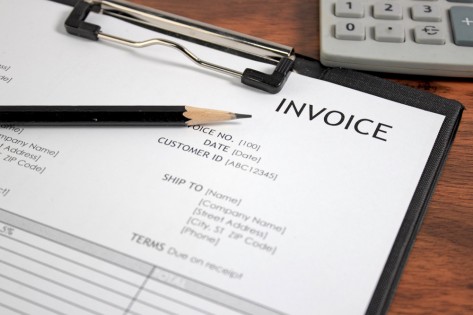Wasp Barcode Technologies: The Barcode Solution People
The Effects and Preventative Measures That Go Along With Unpaid Invoices

What do freelancers, solopreneurs, small business owners, and large corporations all share in common? They all run the risk of taking on a client that, for one reason or another, doesn’t pay the tab.
In fact, almost
50 per cent of all UK small businesses are still waiting for clients to pony up an estimated £44.6
billion in late payments. Ten per cent of those SBEs are owed more than £100,000; 20 per cent wait for something in the neighbourhood of £25,000.
Sixty-seven per cent
might receive payment – after a month’s time; half wait a full
three months before they see a cheque. As you might imagine,
such delays can lead to severe consequences for the little business that tries.
A full third of these business find themselves faced with
cash flow troubles because of these late payments; in 2105, a quarter of SBEs that suffered through these difficulties risked closure because of them.
The sad fact is the UK’s overdue payment rate stands more than
20 per cent greater than the European average (62.3 per cent to 40.4per cent). Not only does this affect a business’s financial ability to operate, but think of the man-hours and efforts wasted in attempts to contact clients and receive their due! How else could those hours be spent?
Promoting your business, perhaps? Increasing your client base? Furthering your business goals?
But, instead, you attempt to get what your nonpaying clients owe you…so how do you go about that?
Steps Toward Collection
Your
first and best step is to, of course try to get in contact with the client in question. Generally, your client gets 30 days to may payment unless other arrangements are specified in the original contract. A lot can happen in 30 days.
Note: According to EU standards, public authorities must pay within 30 days, with exceptions under extenuating circumstances available for 60 days; private enterprises receive a 60-day window.
Just as you have your own business to run, your client has other responsibilities. The missed payment could be an honest mistake. On a first offense, give the client the benefit of the doubt; repeat offenses likely indicate a trend.
Next you should resubmit your invoice, which can become tricky: The decision to apply interest or a late fee rests solely with
you. You could base your decision off your past working history with the client – first missed payment versus fourth, new customer and old client, etc.. You could utilize a “strikes” policy where you charge after a certain number of late payments (or sent invoices).
You might experience concerns over potential
damage to your relationships if you choose to add interest. You might wonder if it will even get paid.
Say you choose to add interest: How much is appropriate?
According to the Bank of England,
statutory interest is 8 per cent of your owed sum plus the BoE bare rate for B2B transactions. So, if your client owes you £1,000:
Take your sum owed and multiple it by the combined percentage: £1,000 x 0.0085 = £85.
Now divide your product by the total number of days in the year: £85/365 = 0.23 or 23p per day.
Multiply that amount by the total number of days late: 50 x 0.23 = 11.5 or £11.50.
Your new invoice would read for £1011.50
Should you submit a
third invoice, you still consider your original sum owed when you calculate the interest,
not the second total.
Should your debt go 90 days unpaid, you may be forced to call in a
debt collection agency. We would all rather handle such delicate issues with as little fuss as possible (which would entail on-time payments), but things don’t always go so smoothly. A debt collection agency will take many of the same steps you would – phone calls, post, email – but will also seek legal recourse if absolutely necessary.
Reputable agencies will most likely not become involved until an invoice goes 90 days past due. These agencies will also provide firm but respectful efforts to obtain payment, not harassment tactics or illegal methods. Be sure to do due diligence with your research if you find yourself in need of a collector.
Just as a collection agency can sue for payment, so can you, but remember: The time and money that go into such a lawsuit may only prove worthwhile if the client owes you a great deal of money. Such actions typically also become the death knell for any working relationship between your parties.
[Tweet "Just as a collection agency can sue for payment, so can you."]

How Might You Avoid This Debacle
You don’t want to build a reputation as difficult to work with, but you can’t afford to run on past-due notices. Before you get involved with new clients, take the time to ask around colleague businesses and see if anyone interacted with them in the past. Check reputable websites like
Experian to see if there are any hiccups in the potential client’s credit history.
Try to keep a
professional-yet-friendly relationship with your client, especially the person who handles invoices. This could make things less tense in the event of an accidental oversight, or even an embarrassing one.
Spell out the
terms of payment clearly in your invoice: When payment is due, what constitutes tardiness of payment, and any penalties to be faced. Don’t be afraid to ask for a
deposit on large projects and invoice immediately upon completion. If it comes to it, go after those late fees: Much as in private life, sometimes the best way to drive a message home is with a hit to the pocketbook.
Have your SBE experienced any problems with collection of payments? How did you handle the incidents? How is your relationship with that client?
 What do freelancers, solopreneurs, small business owners, and large corporations all share in common? They all run the risk of taking on a client that, for one reason or another, doesn’t pay the tab.
In fact, almost
What do freelancers, solopreneurs, small business owners, and large corporations all share in common? They all run the risk of taking on a client that, for one reason or another, doesn’t pay the tab.
In fact, almost 


